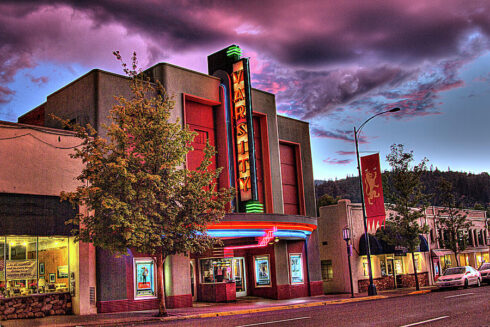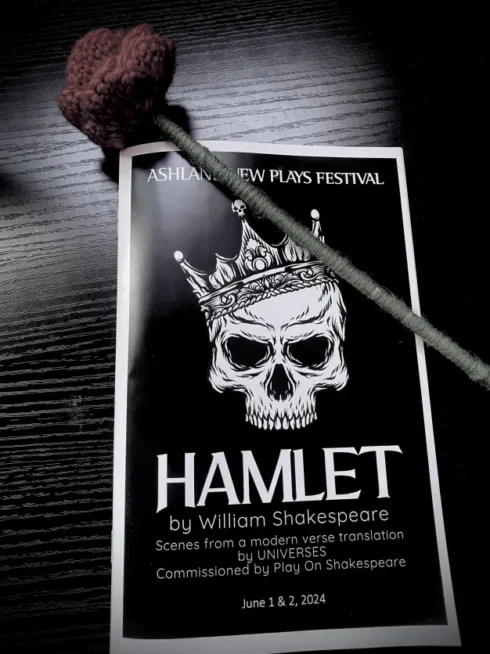Sleeping, knowingly, and choosing not to awaken, living in “a dream you’ll never want to leave” is how The Washington Post describes living in Ashland, Oregon.
Home to the Oregon Shakespeare Festival in 1935, Ashland has been known for its success with the arts ever since.
This past week it was the local stage of the Ashland Independent Film Festival (AIFF) whose parental spark, The Southern Oregon Film Society, came onto the local scene in 2001.
Since the conception of the AIFF, each year (except for 2002), in the spring, according to AIFF’s official website (ashlandfilm.org,) the festival: attracts “over 7000 film lovers,” “to watch over 90 documentary, feature and short films in five days,” and declares a visionary statement “to be the premier destination film festival in the Pacific Northwest.” The aforementioned work, and the reality of locational significance, has championed Ashland into the role of “the number one small town to live and work in as a moviemaker” by MovieMaker Magazine in 2015.
With Ashland’s newly crowned first place award by MovieMaker Magazine this year, Southern Oregon University’s Robert Arellano (“Bobby”), Frank Hall Green, Andrea Scott and brothers Bill and Turner Ross were panelist on this first ever Casting the Location panel. The event was moderated by another SOU full time faculty member, and award winning independent film director, Andrew Gay. The event took place Friday, April 10th, at the historic downtown Ashland Springs Hotel.
So what is a great shooting location? “What films do you love based on their location, what films have a strong sense of place,” asked the moderator. Going down the line of panelist, each was asked to give answers to these questions regarding setting and how that has become “character” in the particular films they’ve showcased at this years festival.
From The Denali National Park of Alaska where Frank Green, and crew, gained a rare permit (maybe the only thus far for a fictional story) to shoot his narrative film, Wildlike. Mr. Green says the story is about, “a girl sent to live with her uncle in Juneau who took advantage of her,” before she went deep into the frontier and a “loss of innocence.” Frank and the film team would have to hike an additional 3000 miles of Alaskan countryside (the locational, visual inspiration) in order to craft this story. To Western, a documentary, filmed by the Ross brothers during their thirteen months in Eagle Pass Texas; a border town between Mexico and the United States that Turner Ross said to be “connected by a river though divided by a fence.” Onward, westward from Texas to Florence, a mid-southern Arizona town with a population of just under 27000 where Andrea Scott created her first feature documentary that looks more deeply into the existence of the nine prisons (some private and for profit); the first arriving in “1908 when Arizona was still a territory,” said Scott, “built by inmates” that would call Florence home. The second would not arrive until the 1970’s incarceration boom. The audience was locally transported, verbally, about five miles, approximately west, on highway 99 to Talent Oregon by our hometown director, Bobby, of Fill My Mirrors, a: song, short film and music video around a daily commute, Barely Used Beds, and a hardware/liquor store (that some time ago “gave up the hardware portion,” said, Bobby, prompting laughter from the audience). He admitted, jokingly, or maybe not, to be a patron, and that he would go “for the screwdriver,” sometimes, continuing…“a location scouts us.”
As each of the directors more deeply discussed the sites they chose, and why…the event became wealthier, rich as: everyone has a story to tell, unseen “emotional intelligence” mentioned by Andrea seemed to bathe the atmosphere with an invisible medicine, group laughter (especially as the Ross brothers sparred with each other from their lifelong relationship and memories) rolled through the room, When Frank Hall Green stated that “human beings are defined by place,” a sense of kindred spiritedness seem to grace those present.
Casting the Location lent itself to more than just jokes. Richly deep quotes choked up more than just one panelist. With somewhat watery eyes, Turner Ross humbly spoke of, “every time you film something…your changed.” The audience, silenced and properly present listened as Bill Ross mentioned, “a handshake means something,” his brother included; in respect of the world of the locals, when on location, “your not there to insert some opinion that you have…you’re there to receive.”
Without assuming critically that Robert Arellano’s film somewhat questions casual drinking, the viewer may come to realize, as Bobby says: “the kindest compliment” he’s received from the film was from Ron Todd (owner operator, along with his son Ron Jr., of, Talent Liquor) “’that was such a great story about fathers and sons, it reminds me of my own feelings about my son, and my experiences as a son growing up too.”
The panelist said in so many different ways, whether you’re in: the number one place in America to live as a film maker, Texas looking over into Mexico or Mexico gazing across the river and through the fence at Texans, ordering a milkshake at a Sonic in Florence, Arizona while locking eyes with an inmate in the prison behind the Sonic, driving down local highway 99 past Barely Used Beds, or hiking Alaska’s rarely traveled wilderness, ‘don’t abuse the location…it means everything, respect the locals.’
So, as the native population increased by thousands this past week for the fourteenth annual Ashland Independent Film Festival, and the lines extended from outside The Varsity Theatre and The Armory…this festival evokes the idea of location as being among the main characters in any story.



